Because I’m a picky eater, I make sure to take a vitamin every single morning to ensure I’m getting my essential nutrients.
Why the morning? It is recommended to eat foods that contain natural vitamins in the morning, as they are absorbed and digested throughout the day.
The kind of vitamins you take will differ from person to person. For example, if you’re trying to get pregnant, you’ll need more folic acid than someone who isn’t. If you’re low on B12, you’ll need more than another person.
You can find this information through routine bloodwork at your annual doctor’s appointment. I suggest making that the first thing you do. Asking your doctor what the best organic multivitamin is based on your bloodwork to make sure you’re getting key nutrients is super important.
Below this list, I’ll also share some more information about the importance of vitamins for women.
Right now, I’m taking vitamins with higher amounts of biotin than normal because I suffer from hair loss. (They’re actually prenatal vitamins.)
There are many great options for the best multivitamins and mineral supplements that can work for you. Here, I’m sharing my top picks to choose from on Amazon to make up for nutritional gaps. Some of these are affiliate links.
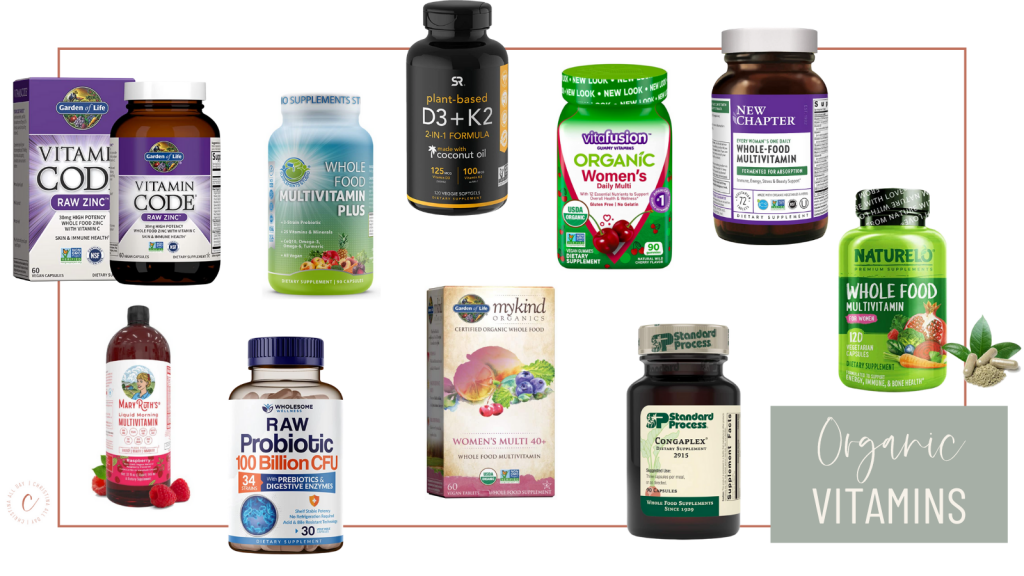
10 Best Organic Vitamins for Women on Amazon
Before I get to the list of the best multivitamins, here are some things to keep in mind (in addition to eating a healthy diet and balanced diet).
- For general well-being and health, use products containing vitamins A, B2, B6, and B12, C, D, and E, as well as calcium and zinc.
- For pregnant women, the most suitable supplements contain folic acid, and minerals like calcium, iron, magnesium, phosphorus, potassium, and vitamin B5.
- For people over 60 years old, multivitamins with B vitamins, vitamins C, D, and E, calcium, phosphorus, iodine, and zinc are recommended… with an emphasis on calcium.
- For those looking for more energy and endurance, supplements with vitamin B2 and vitamin B12, vitamins C and D, niacin, pantothenic acid, phosphorus, and potassium will help you.
- For those looking to increase muscle, vitamins C and D, calcium, copper, potassium, and magnesium are best. You may also want to look into increasing your protein intake.
1. Garden of Life mykind Organics vitamins for Women 40+
Click here to buy it on Amazon for $34.
This multivitamin supplement is targeted at women over 40 years old. It has 16 vitamins and minerals at 100% DV or higher, like vitamins C, E, D3, biotin, iodine, and folate.
It is a vegan, gluten-free, non-GMO verified whole food multivitamin with NO synthetic binders or fillers, focused on hormone and breast support. Also, it comes with 9mg of plant iron for blood support.
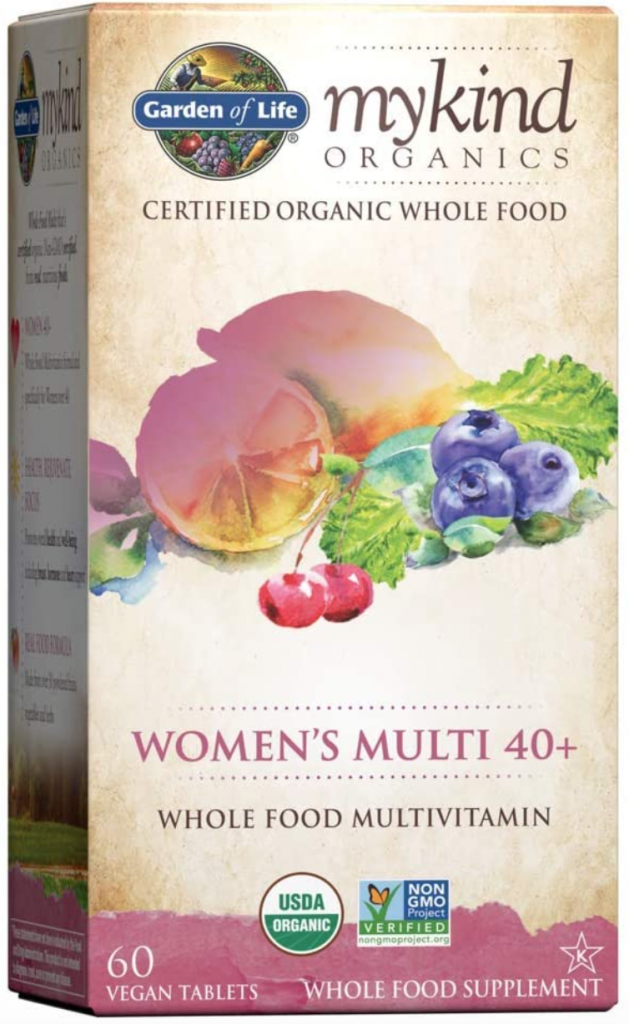
2. NATURELO Whole Food Multivitamin for Women
Click here to buy it on Amazon for $45.
This multivitamin is targeted at younger women and includes plant-based vitamins and minerals including vitamin D3 from lichen, vitamin E from sunflower, and calcium and magnesium from marine algae.
Something that makes it stand out from others is the blend of digestive enzymes and probiotics included to help your body break down and absorb the nutrients in your multivitamin and food to support healthy digestion.
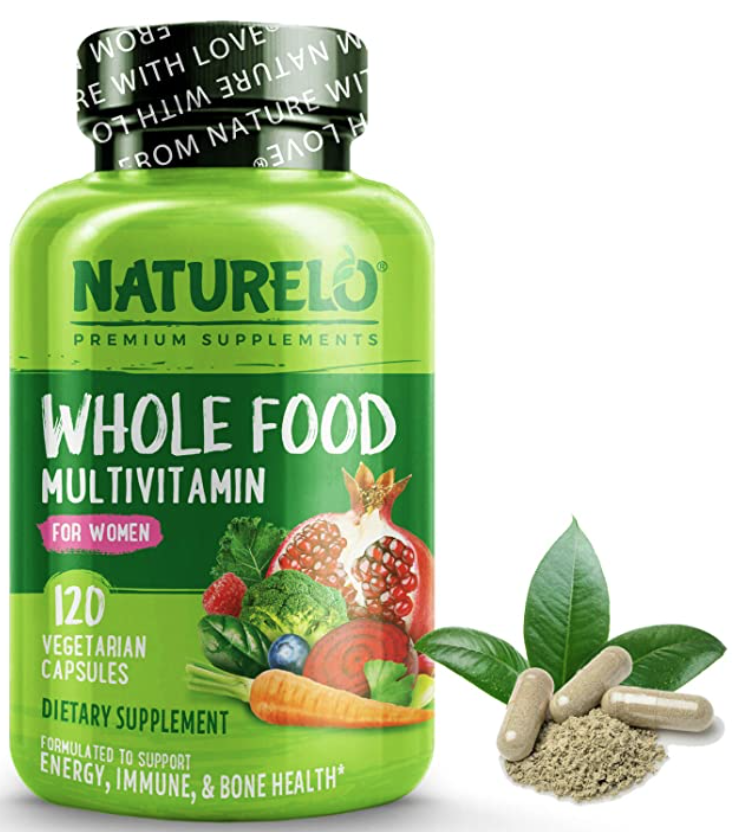
3. Vitafusion Organic Women’s Gummy Multivitamin
Click here to buy it on Amazon for $10.
Organic and non-GMO, this gummy vitamin is perfect for those who don’t like the sensation of taking pills.
This gummy multivitamin is suitable for any age group and contains vitamin A, vitamin C, vitamin D, vitamin E, vitamin B12, vitamin B6, niacin, folate, biotin, pantothenic acid, iodine, and chromium. It supports overall health and wellness and also improves the appearance of skin due to its powerful antioxidants.
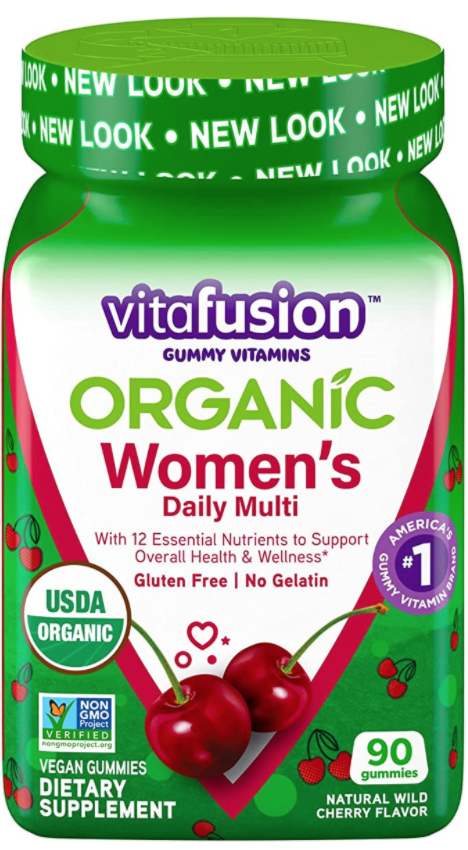
4. Vitamin D3 + K2 with Organic Virgin Coconut Oil
Click here to buy it on Amazon for $38.
This vitamin contains 5000 IU (125 mcg) of vegan vitamin D3 and 100 mcg of vitamin K2 as MK-7.
Vitamin D3 is the best natural source of vitamin D and binds to the body’s fat cells for future use. The combination of D3 + K2 strengthens the immune system and can prevent the emergence of autoimmune diseases such as the flu and seasonal allergies.
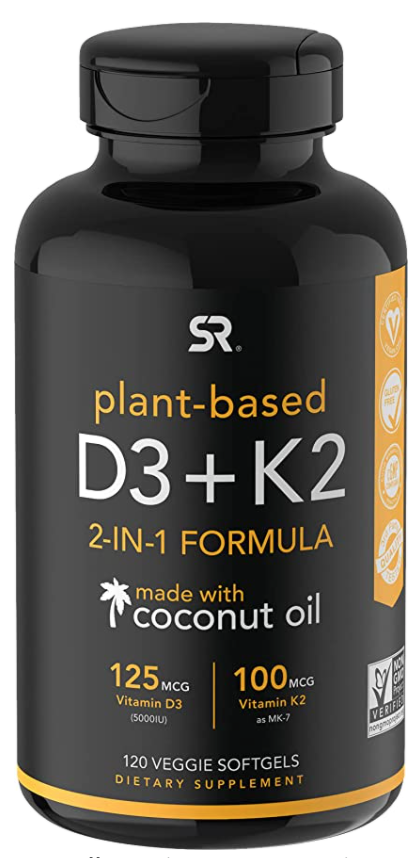
5. Supplements Studio Daily Vegan Whole Food Multivitamin Plus
Click here to buy it on Amazon for $23.
This multivitamin, both for men and women, provides 100% of the daily requirement for optimum nutrition and complete multi-system support with a formula that contains vitamin A, vitamin B-complex, vitamin C, vitamin D3, vitamin K2, vitamin E, biotin, and iron.
It is made to boost your energy and immune system and also provides probiotics for good health.
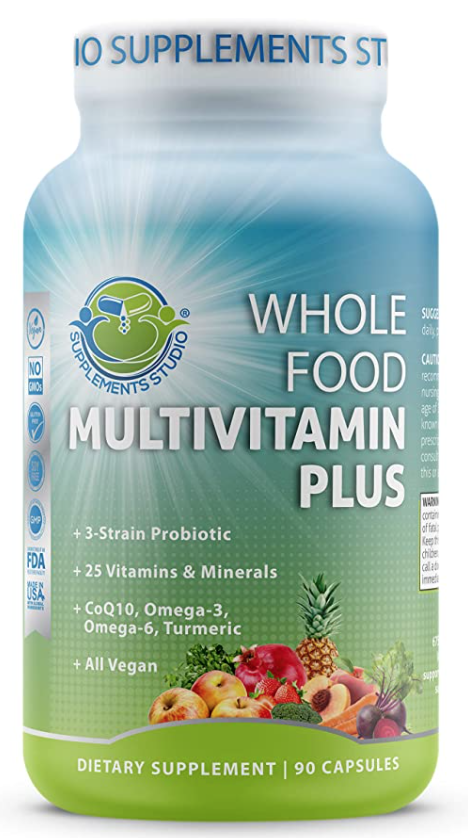
6. Morning Liquid Vitamins by MaryRuth’s
Click here to buy it on Amazon for $40.
MaryRuth’s raspberry morning multivitamin is an easy-to-take liquid with essential vitamins, minerals, antioxidants, and amino acids for the body’s daytime needs. (The artificial flavors make it taste good too.)
B vitamins are vital for metabolic processes, energy levels, as well as the nervous system. This blend of B vitamins performs functions such as aiding in amino acid metabolism, blood cell production, DNA production and regulating gene expression, circulatory health, and supporting energy.
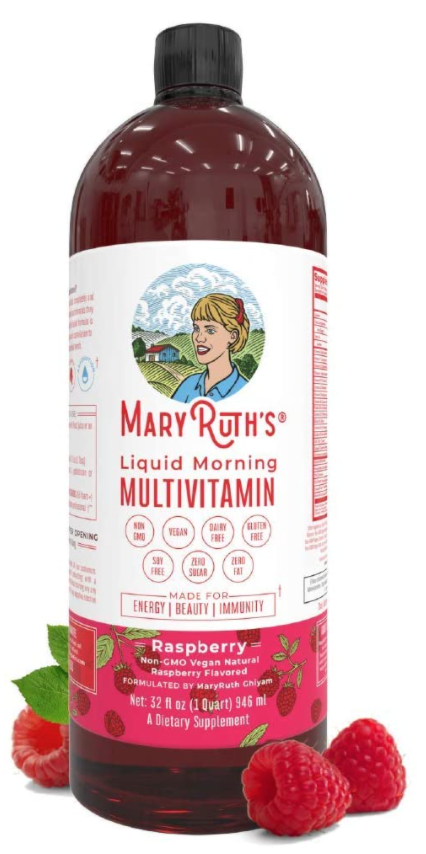
7. Garden of Life Vitamin Code Raw Zinc
Click here to buy it on Amazon for $10.
Vitamin Code Raw Zinc is whole food nutrition daily vitamin, specifically formulated to provide 30mg of high-potency zinc (273% of the Daily Value) plus 60mg of vitamin C. It also includes 23 powdered organically grown fruits and vegetables and 75 alkalizing trace minerals.
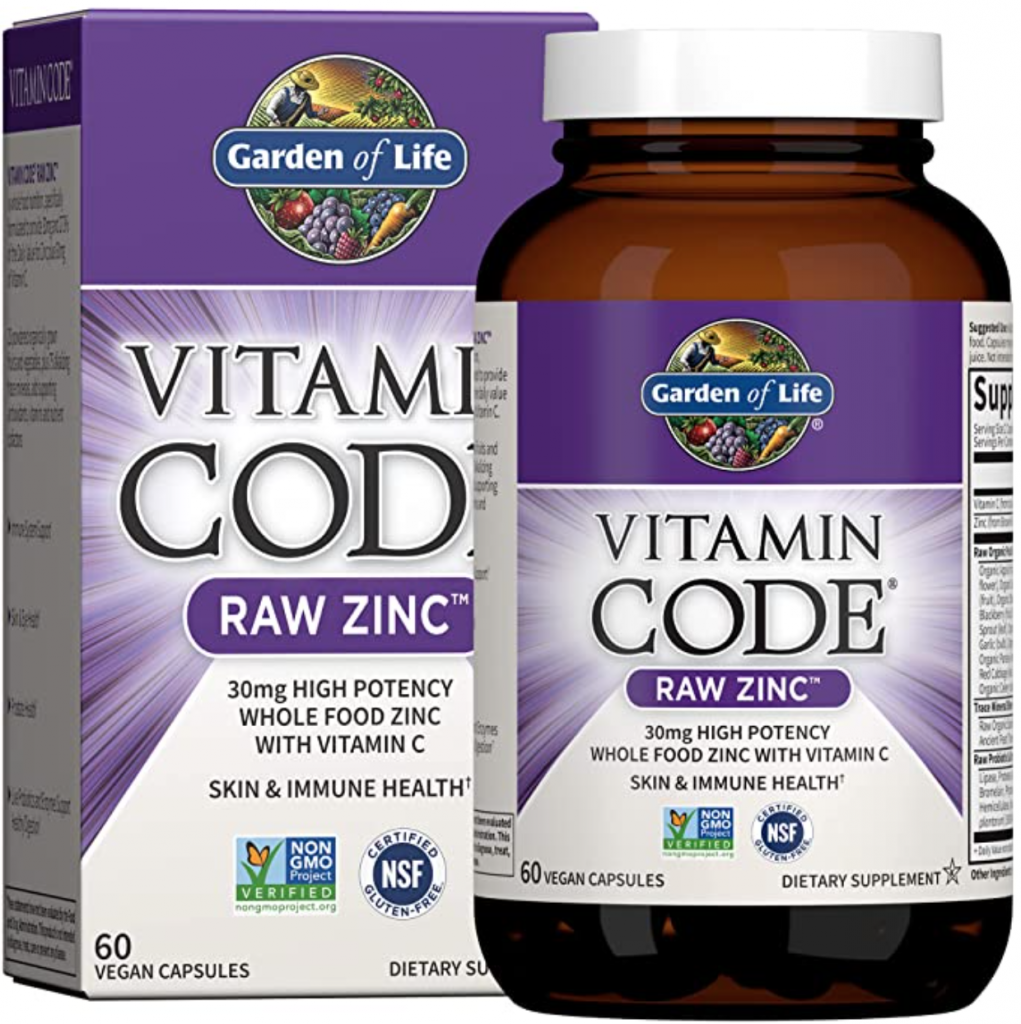
8. Standard Process Congaplex
Click here to buy it on Amazon for $29.
Congaplex is used for short-term support of the immune system. It supports healthy immune system function, the thymus gland, and contains ribonucleic acid which the body uses to build new cells.
It also contains a combination of key ingredients from Cataplex A-C, Thymex, Calcium Lactate, and Ribonucleic Acid (RNA) and it is an excellent source of antioxidant vitamin A.
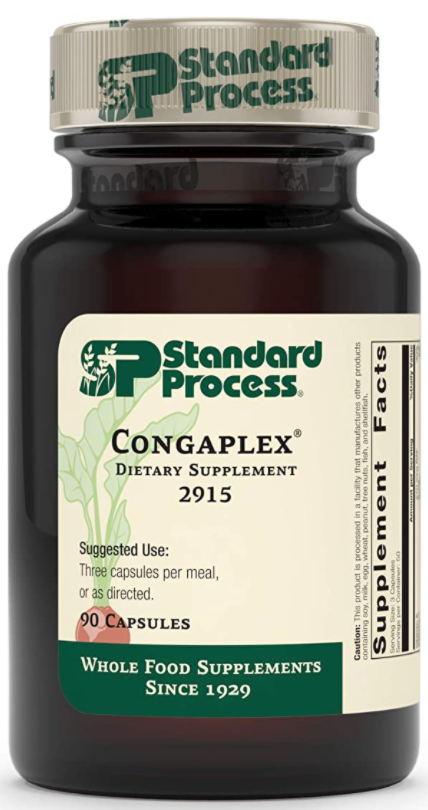
9. Organic Probiotics 100 Billion CFU
Click here to buy it on Amazon for $25.
This probiotic is made with digestive enzymes and probiotics based on clinical testing. A complete once-daily probiotic supplement for ultimate digestive health naturally helps to support the free stomach digestive environment biotic condition and supports the natural stomach balance.
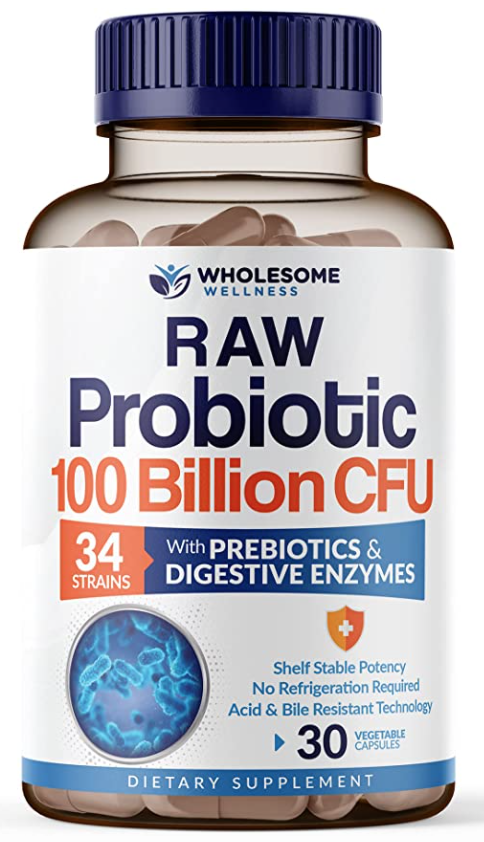
10. New Chapter Women’s Multivitamin + Immune Support
Click here to buy it on Amazon for $36.
This multivitamin provides enhancement of overall wellness with immune, energy, stress, and beauty support. New Chapter’s women’s multivitamin is made with organic, non-GMO ingredients.
It is a great fermentation with whole foods and probiotics and each blend is designed so the body can absorb the nutrients. It is also gentle on an empty stomach.
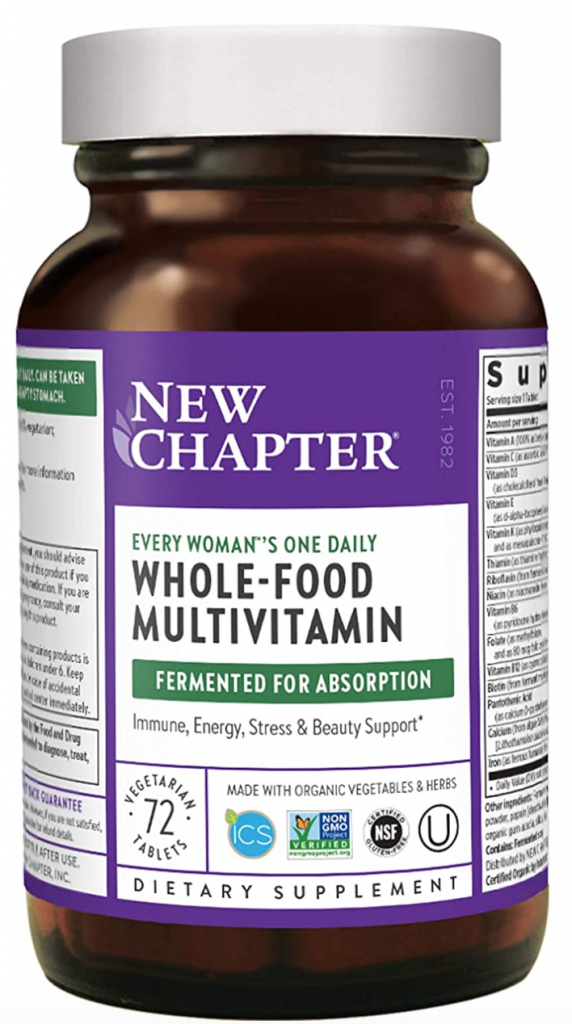
Best Vitamins on Amazon
Do you prefer gummy vitamins, pills, liquids, or other dietary supplements? Let me know what other synthetic vitamins, omega-3 fatty acids, or organic supplements I should add to this list on Instagram at @ChristinaAllDay.
In your opinion what are the best vitamin brands? Best supplement brands? What high-quality multivitamin is meeting your nutrient needs on a daily basis?
Women and Vitamins
As women, we face unique physiological and hormonal changes throughout our lives, which necessitates paying special attention to our nutritional needs.
While a well-balanced diet forms the foundation, it is often beneficial to supplement our intake with essential vitamins. These tiny powerhouses can make a significant difference in our overall well-being, bolstering our immune system, supporting hormonal balance, and enhancing our vitality.
In this section, I dive into the importance of women taking vitamins and unveil the treasure trove of benefits they offer.
Bridging the Nutritional Gap
Despite our best efforts, it can be challenging to achieve optimal nutrition solely through diet. Busy schedules, dietary restrictions, and changing food availability often lead to nutrient deficiencies.
Vitamins act as a safety net, filling in the nutritional gaps that may arise. By including a well-rounded vitamin regimen in our daily routine, we ensure that our bodies receive the necessary vitamins and minerals they need to function optimally.
Nurturing Our Unique Needs
Women undergo distinct physiological changes, including menstruation, pregnancy, and menopause, which impact their nutritional requirements. These phases demand increased levels of certain vitamins to support our bodies adequately.
For instance, iron becomes vital during menstruation to replenish the blood lost, while folate plays a crucial role in preventing neural tube defects in early pregnancy. Vitamins tailored for women can help address these specific needs and promote overall health during various stages of life.
Strengthening the Immune System
A robust immune system serves as our shield against illnesses and infections. Vitamins like vitamin C, vitamin D, and zinc bolster our immune function, helping us ward off common ailments.
Women, especially those managing hectic lifestyles, need to prioritize their immune health. By consistently taking vitamins, we can fortify our immune system, reducing the likelihood of falling prey to seasonal viruses and infections.
Supporting Hormonal Balance
Hormonal fluctuations can wreak havoc on our well-being, impacting everything from mood swings to energy levels. Vitamins, particularly B vitamins and vitamin D, play crucial roles in regulating hormone production and maintaining balance.
They support the functioning of the endocrine system, which controls hormone release. By providing our bodies with these essential vitamins, we can promote hormonal harmony and experience improved emotional stability, increased energy levels, and overall mental well-being.
Nourishing Hair, Skin, and Nails
The desire for healthy hair, radiant skin, and strong nails is universal among women. Our external appearance often reflects our internal health.
Vitamins such as biotin, vitamin E, and vitamin A contribute to maintaining the health and vitality of our hair, skin, and nails. These vitamins promote collagen production, protect against oxidative stress, and enhance cell regeneration, resulting in a radiant and youthful appearance.

What’s the Best Vitamin for me?
The vitamins women need change from person to person and essential blood work can shed light on our individual nutritional requirements.
First, consult with a healthcare professional.
Before embarking on any vitamin regimen or undergoing blood work, it is crucial to consult a healthcare professional. They can assess your medical history, current health status, dietary habits, and lifestyle factors to provide personalized guidance.
A healthcare professional, such as a doctor or registered dietitian, will have the expertise to determine the specific vitamins you may need based on your unique circumstances.
Get a comprehensive blood panel.
A comprehensive blood panel can provide valuable insights into your nutritional status. The following blood tests are commonly used to evaluate vitamin deficiencies in women:
a. Vitamin D: This test measures the levels of vitamin D in your blood, which is essential for bone health, immune function, and overall well-being.
b. Vitamin B12: This test assesses your levels of vitamin B12, crucial for nerve function, energy production, and the formation of red blood cells.
c. Iron and Ferritin: These tests evaluate iron levels and ferritin (a protein that stores iron), essential for oxygen transport, energy production, and preventing anemia.
d. Folate: The folate test measures folate levels, particularly important for women of childbearing age as it supports proper fetal development and prevents neural tube defects.
e. Vitamin A, E, and K: Blood tests can determine the levels of these fat-soluble vitamins, which are important for vision, immune function, blood clotting, and antioxidant protection.
Identify deficiencies and supplementation.
Once the blood test results are available, your healthcare professional can identify any deficiencies or suboptimal levels. Based on these findings and considering your individual circumstances, they can recommend specific vitamin supplements or dietary modifications to address any deficiencies.
Supplements may include a wide range of vitamins such as vitamin D, vitamin B12, iron, folate, and others, depending on your needs.
Consider your lifestyle and diet.
While supplements can be beneficial, it is important to remember that they should complement a healthy and balanced diet. Nutrients are best absorbed from whole foods, so incorporating nutrient-dense foods such as fruits, vegetables, whole grains, lean proteins, and healthy fats into your diet is essential.
Your healthcare professional can provide guidance on dietary modifications that can help optimize your nutritional intake.
Monitor.
Once you begin supplementing with vitamins or modifying your diet, it is important to have regular check-ups with your healthcare professional. They can monitor your progress, adjust your supplement regimen if needed, and ensure that your nutritional needs are being met effectively.
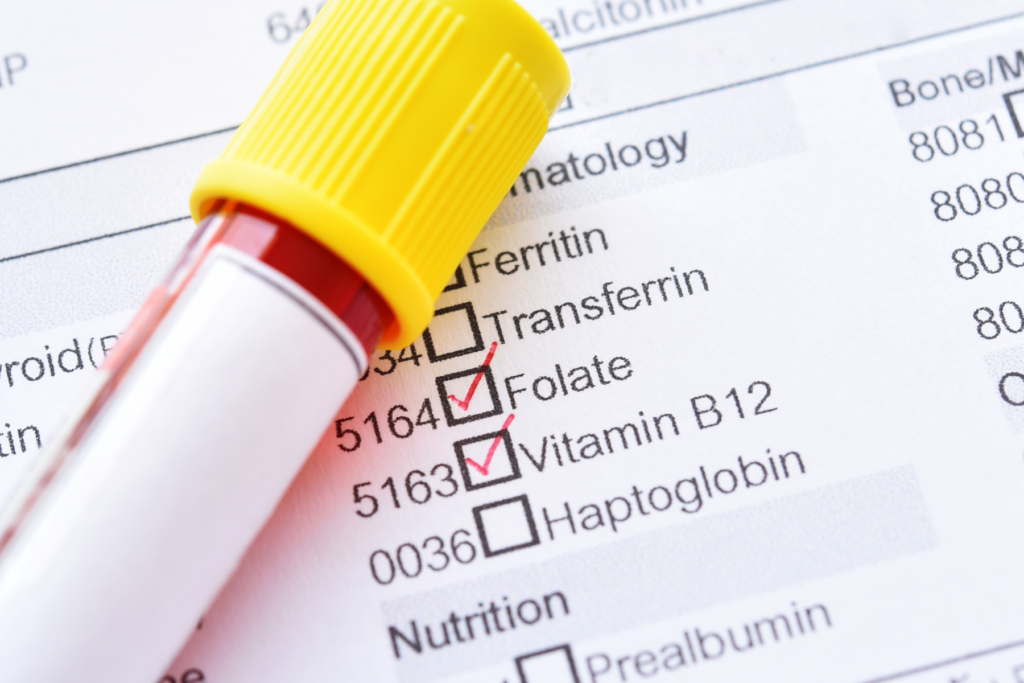
Organic Vitamins vs. Non-Organic Vitamins
As consumers become increasingly conscious of the products they consume, the debate between organic and non-organic vitamins has gained momentum.
While both types offer nutritional benefits, understanding the difference between organic and non-organic vitamins can help us make informed choices about the supplements we incorporate into our daily routine.
Organic Vitamins: Nature’s Finest Offerings
Organic vitamins are derived from organic sources, typically plants or plant-based ingredients. These vitamins are cultivated using organic farming practices that promote soil health, minimize the use of synthetic fertilizers and pesticides, and prioritize sustainability. Here are some key aspects of organic vitamins:
Organic Certification
Organic vitamins are produced from organically grown ingredients that adhere to specific regulations set by certifying bodies. These certifications ensure that the plants used to extract vitamins are grown without the use of synthetic chemicals, genetically modified organisms (GMOs), or irradiation.
Look for reputable certifications like USDA Organic or Certified Organic to ensure the authenticity of organic vitamins.
Nutrient Quality
Organic farming practices aim to enhance soil fertility and plant health naturally. It is believed that these practices can result in nutrient-rich plants, potentially offering higher levels of vitamins, minerals, and antioxidants compared to conventionally grown counterparts.
However, the nutrient content can still vary depending on factors such as soil quality, climate conditions, and plant species.
Reduced Environmental Impact
Organic farming practices prioritize sustainability and environmental stewardship. By avoiding synthetic chemicals, organic agriculture helps minimize pollution, conserve water resources, and protect biodiversity.
Choosing organic vitamins supports these eco-friendly practices, contributing to a more sustainable future.

Non-Organic Vitamins: Engineered for Nutrition
Non-organic vitamins, also known as synthetic or conventional vitamins, are manufactured through laboratory processes. These vitamins are created by chemically synthesizing isolated compounds or extracting nutrients from non-organic sources. Here are some key aspects of non-organic vitamins:
Standardized Nutrient Levels
Non-organic vitamins are carefully formulated to provide specific nutrient levels, ensuring consistency and accuracy in each dosage. This standardization can be particularly useful when targeting specific deficiencies or when precise nutrient intake is required.
Accessibility and Affordability
Non-organic vitamins are widely available, accessible, and often more affordable compared to organic vitamins. This accessibility makes them a convenient option for individuals seeking to supplement their nutritional intake without additional considerations or constraints.
Quality Control and Fortification
Non-organic vitamins undergo stringent quality control measures during production to ensure safety, purity, and potency. Additionally, they are often used in food fortification programs to address specific nutritional deficiencies in populations, providing an effective means of nutrient supplementation.
When it comes to choosing between organic and non-organic vitamins, several factors should be considered:
- Personal Values: Consider your personal values and priorities, including your preference for organic or sustainable products and your commitment to supporting organic farming practices.
- Dietary Restrictions and Allergies: Evaluate any dietary restrictions or allergies you may have, as certain non-organic vitamins may contain allergens or ingredients that do not align with your dietary needs.
- Budget and Accessibility: Consider your budget and the availability of both organic and non-organic vitamin options. Organic vitamins may be relatively more expensive or less widely accessible compared to their non-organic counterparts.
- Nutrient Needs: Focus on your specific nutrient requirements and consult with a healthcare professional or registered dietitian who can help determine the most appropriate vitamin regimen for your individual needs.

By acknowledging our unique needs as women and supplementing our diets with appropriate vitamins, we embrace a proactive approach to our overall well-being.
Remember, before starting any new supplement regimen, it is advisable to consult with a healthcare professional to determine the most suitable vitamins for your individual needs.
Note: This blog post is for informational purposes only and does not replace professional medical advice. Always consult a healthcare professional before making any changes to your diet or supplement routine.
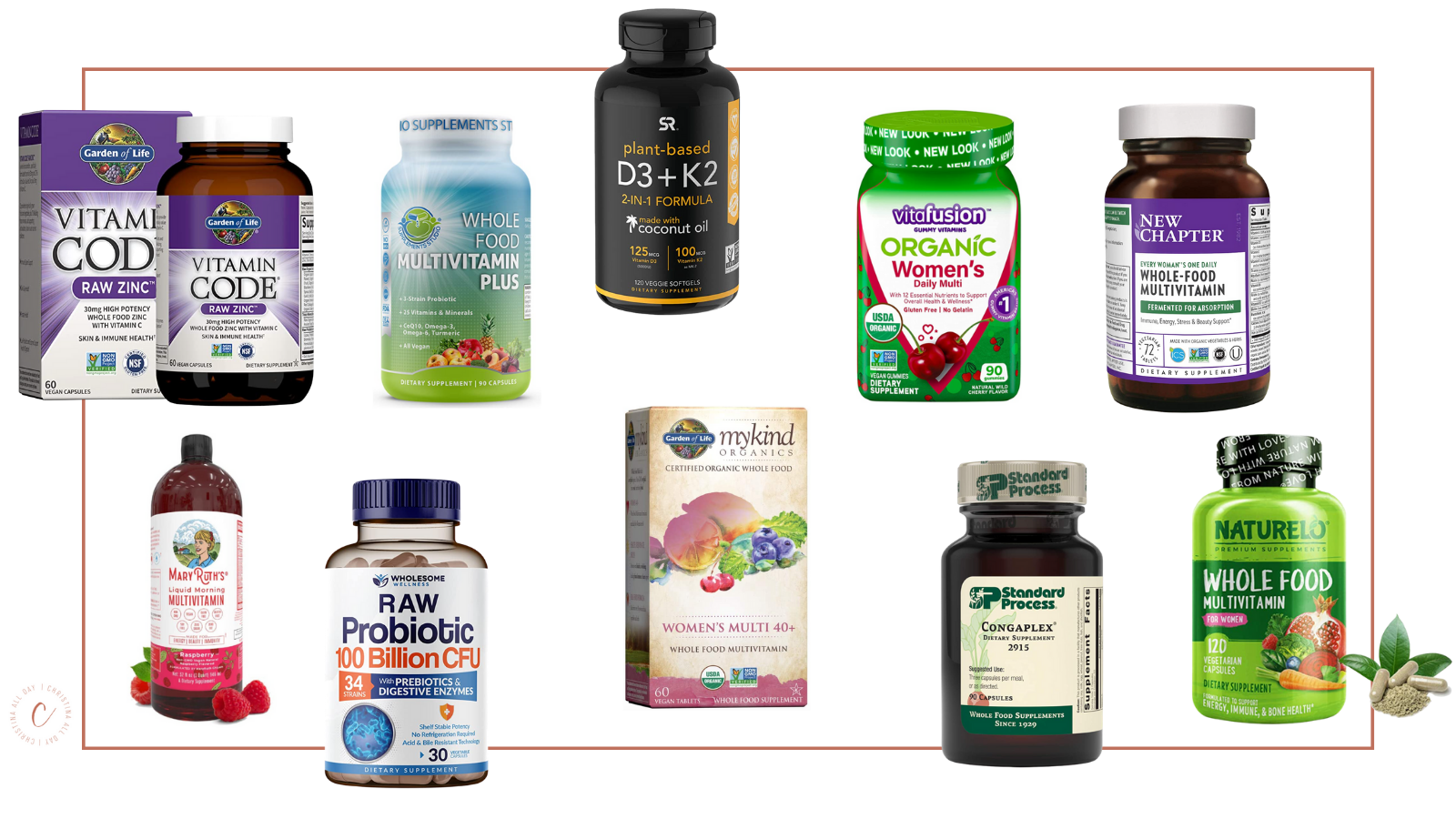
Where can I buy these if I choose to buy one of these multivitamin now and how much does it cost?
They’re all linked on Amazon 🙂